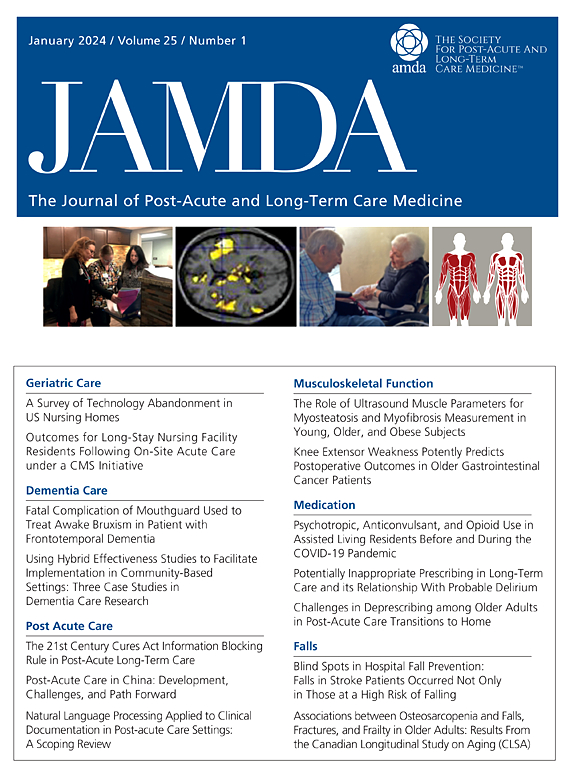Influences of Social Disengagement and Depressive Symptoms on Sleep Disturbance in Dementia Caregiving Dyads: A Nationally Representative Study
IF 4.2
2区 医学
Q2 GERIATRICS & GERONTOLOGY
Journal of the American Medical Directors Association
Pub Date : 2024-10-01
DOI:10.1016/j.jamda.2024.105197
引用次数: 0
Abstract
Objectives
To examine the influence of social disengagement and depressive symptoms on sleep disturbance among dementia caregiving dyads and the actor-partner interdependence nature of these influences.
Design
Actor-partner interdependence model through structural equation modeling for dyadic analyses.
Setting and Participants
A total of 310 dyads of older adults with dementia and their care partners from 2 national representative studies in the United States, the National Health and Aging Trends Study (NHATS) and its companion study, the National Study of Caregiving (NSOC).
Methods
Data from the NHATS Round 11 and NSOC IV were analyzed using descriptive statistics, Pearson correlation analysis, and the actor-partner interdependence model. Structural equation modeling was used to assess the mediation effects of depressive symptoms within the actor-partner interdependence models.
Results
In the model of caregivers, social disengagement had a direct impact on sleep disturbance (β = 0.49, P < .001) and an indirect impact through depressive symptoms (β = 0.25, P < .001). In the model of older adults with dementia, social disengagement only had an indirect effect on sleep disturbance through depressive symptoms. In models examining partner effects, caregivers' social disengagement directly influenced their care partners' depressive symptoms (β = 0.20, P = .019), which subsequently affected caregivers’ sleep disturbance (β = 0.17, P < .001). Social disengagement (β = 0.17, P = .001) and depressive symptoms (β = 0.17, P < .001) in older adults with dementia directly impacted their caregivers' sleep disturbance. Depressive symptoms of older adults with dementia served as multiple mediators linking one member's social disengagement to both their own and partner's sleep.
Conclusions and Implications
This study represents one of the first attempts to investigate the influencing mechanism of sleep disturbances among older adults with dementia and their informal caregivers through a dyadic perspective. The sleep disturbance of caregivers may be directly influenced by the social disengagement and depressive symptoms exhibited by both members of the dyad, whereas the sleep disturbance experienced by older adults with dementia can only be indirectly influenced by the dyad's social disengagement via their own depressive symptoms. Dyadic social activities targeting depressive symptoms could be designed to address sleep disturbances in dementia caregiving dyads.
失智症护理双人家庭中社交脱离和抑郁症状对睡眠障碍的影响:一项具有全国代表性的研究。
目的:研究社会脱离和抑郁症状对痴呆症护理二人组睡眠障碍的影响,以及这些影响的行为者-伴侣相互依存性质:研究社会脱离和抑郁症状对痴呆症护理二人组睡眠障碍的影响,以及这些影响因素的行为者-伙伴相互依赖性质:设计:通过结构方程模型建立行动者-伙伴相互依存模型,进行二元分析:美国两项具有全国代表性的研究--全国健康与老龄化趋势研究(NHATS)及其配套研究--全国护理研究(NSOC)--共收集了310个患有痴呆症的老年人及其护理伙伴的二元组:采用描述性统计、皮尔逊相关分析和行为者-伴侣相互依赖模型对 NHATS 第 11 轮和 NSOC IV 的数据进行了分析。结构方程模型用于评估抑郁症状在行为者-伙伴相互依赖模型中的中介效应:结果:在照顾者模型中,社会脱离对睡眠障碍有直接影响(β = 0.49,P < .001),并通过抑郁症状产生间接影响(β = 0.25,P < .001)。在痴呆症老年人的模型中,脱离社交仅通过抑郁症状对睡眠障碍产生间接影响。在研究伴侣效应的模型中,照顾者的社交脱离直接影响其照顾伴侣的抑郁症状(β = 0.20,P = .019),进而影响照顾者的睡眠障碍(β = 0.17,P < .001)。老年痴呆症患者的社交疏离(β = 0.17,P = .001)和抑郁症状(β = 0.17,P < .001)直接影响了其照顾者的睡眠障碍。患有痴呆症的老年人的抑郁症状是将其中一名成员的社交脱离与他们自己和伴侣的睡眠联系起来的多重中介因素:本研究是首次尝试从伴侣关系的角度研究老年痴呆症患者及其非正式照顾者睡眠障碍的影响机制。照顾者的睡眠障碍可能直接受到二人组中双方成员所表现出的社交疏离和抑郁症状的影响,而患有痴呆症的老年人所经历的睡眠障碍只能通过其自身的抑郁症状间接受到二人组社交疏离的影响。可以设计针对抑郁症状的二人社交活动,以解决痴呆症护理二人组的睡眠障碍问题。
本文章由计算机程序翻译,如有差异,请以英文原文为准。
求助全文
约1分钟内获得全文
求助全文
来源期刊
CiteScore
11.10
自引率
6.60%
发文量
472
审稿时长
44 days
期刊介绍:
JAMDA, the official journal of AMDA - The Society for Post-Acute and Long-Term Care Medicine, is a leading peer-reviewed publication that offers practical information and research geared towards healthcare professionals in the post-acute and long-term care fields. It is also a valuable resource for policy-makers, organizational leaders, educators, and advocates.
The journal provides essential information for various healthcare professionals such as medical directors, attending physicians, nurses, consultant pharmacists, geriatric psychiatrists, nurse practitioners, physician assistants, physical and occupational therapists, social workers, and others involved in providing, overseeing, and promoting quality

 求助内容:
求助内容: 应助结果提醒方式:
应助结果提醒方式:


